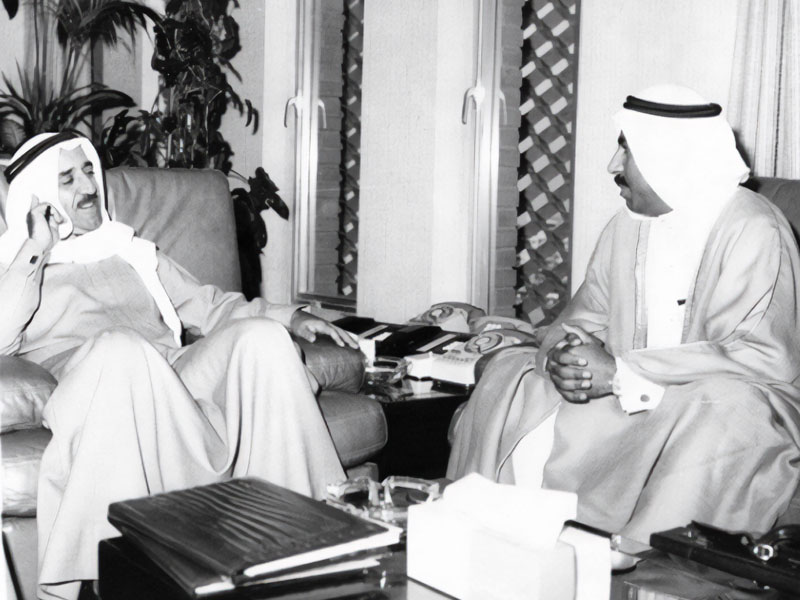A Word from the Editor - The Heritage of the Gulf and the Arabian Peninsula: Remembering Indicators and Signs
Issue 46

In 1981, the print and audio-visual media outlets in the countries of the Arabian Gulf were focused on the news of a first-of-its-kind cultural event aimed at unifying seven countries’ efforts to collect, record and preserve heritage folklore, and the establishment of a specialised scientific centre that would be responsible for this task.
At the beginning of this media frenzy, Dr Mohammed Ghanem Al Rumaihi, a Kuwaiti intellectual, interviewed me on television and broadcast the interview several times. He asked deep, thoughtful, intellectual questions as he explored the idea of establishing this centre, its cultural, social and political dimensions and its potential for success. I was very enthusiastic and optimistic because the AGCC Information Ministers Conference asked me to follow up on the centre’s implementation. I answered Dr Al Rumaihi’s questions as honestly as I could at the time, but my instincts told me that – beneath his intelligent questions – he doubted whether the conference would succeed in implementing the idea in the long run.
At the time, I was preparing to meet with His Highness Sheikh Sabah Al-Ahmed Al-Jaber Al-Sabah, the Emir of the State of Kuwait, who was then the Minister of Foreign Affairs in charge of the Kuwaiti Ministry of Information. We were to sign the agreement to establish the Centre after it was signed by His Excellency Sheikh Ahmed bin Hamed, the United Arab Emirates’ Minister of Information and Culture. My meeting with His Highness Sheikh Sabah Al-Ahmad Al-Sabah was friendly. Before signing the agreement, he inquired about me and about the centre and its headquarters. His Highness’ inquiries were direct and frank; it was only later that I realised what had been behind his inquiries!
After the Ministers of Information signed the agreement, I contacted the United Nations Educational, Scientific and Cultural Organization (UNESCO) to ask for help contacting similar World Heritage Centres so that we could benefit from their experience. At the recommendation of the late novelist Tayeb Salih, a friend who was then UNESCO’s resident representative in the Gulf, a generous Algerian named Cheikh Bakdour Wild Ali, an advisor to UNESCO’s Director General, helped me and arranged for me to meet with Dr Amadou-Mahtar M'Bow, who was UNESCO’s Director-General at the time. I met with him for several minutes and he asked me very precise questions. He told me that the idea was excellent and that it was in line with UNESCO's goals, but that it was too early to implement it. I was angry because I found his words frustrating, but it took me years to realise their wisdom.
I am recounting these events to show that the enthusiasm of the Gulf media had spread to Europe, America and throughout the world. I was invited to participate in the meetings of the International Organization of Folk Art (IOV) in Vienna, Austria. At the same time, His Excellency Dr Issa Ghanim Al-Kuwari, the Chairman of the centre, received an important letter from the Smithsonian Institution, an educational and research institution with museums funded and managed by the US Government. The letter congratulated the Gulf States on the establishment of the centre and asked for permission to send twenty-one expert scientists – all expenses paid – to participate in the collection, recording, classification and documentation of folklore materials from the Arabian Gulf and the Arabian Peninsula. Dr Al-Kuwari showed me the letter and asked my opinion.
I remember being amazed and surprised by this request; I did not sleep for two nights because I was thinking, ‘What is the meaning of this request? And why this group of American scientists? Why the heritage of the Gulf and the Arabian Peninsula? Whose interest is this? Is this genuine assistance to preserve this heritage as part of global heritage? Or is there something I am missing?’. I sought the opinions of the people around me before returning to my friend, Dr Al-Kuwari, with an official letter stating that the people of the Gulf region were better qualified than others to carry out this work. We declined the Smithsonian Institution’s request politely.
Now, more than ten years after the closure of the Arab Gulf States Folklore Centre and a great loss to our heritage, I wonder whether I was right to respond to the Americans’ offer in the way that I did.
Ali Abdullah Khalifa
Editor-in-Chief







































































